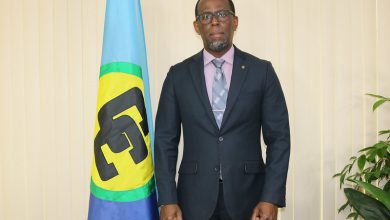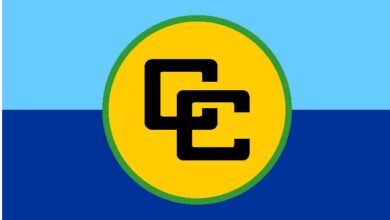The Health of the Region
From the late 1980s to the early 1990s, Physical Education (P.E) and sport was ‘eroded’ in schools throughout the Region. One sports official stated that “the Region is still light years behind in understanding what it means to move sport forward. This may be the result of our history, because we have never put heavy investment into sport.” Research has revealed that the population had become sedentary. Adults and children were weightier and there was a tendency to co-morbidity. Alarmingly, the Region spends close to US$400 million on direct and indirect treatment and care of diabetes alone. Should this trend continue, our human resources, the wealth of the nation, would be tragically, lost
In the year 2002, Professor the Honourable Sir George Alleyne, Chancellor of the University of the West Indies, spearheaded the Caribbean Commission on Health and Development, which investigated the status of health of people in the Region and the impact on Regional economies. The findings were presented to the CARICOM Council for Human and Social Development in 2005.
“Prior to this,” CARICOM Sports Administrator, John Campbell said, “during the late 1990s a call was made for an investigation into the exercise, structure and function of Physical Education and Sport programmes in schools. An Advisory Committee on Physical Education revealed the alarming facts.” It was discovered that in the few schools where P.E. remained on the curriculum there was no adequate training programmes in place for teachers and instructors.
Quite recently, on 26th July, 2006, the Barbados Nation Newspaper quoted the country’s acting Chief Medical Officer Dr. John Licorish as saying that in Barbados, obesity was the single largest preventable cause of death.
“Yet inflated by runaway obesity, more than half this island’s population run the risk of dying prematurely due to an unpleasant and untimely chronic illness-related disease……..64 per cent of Barbadian women and 56 per cent of men now were either overweight or obese. There was more bad news. The World Health Organization (WHO) is predicting that diabetes, which affects about 17 per cent of the population throughout the Caribbean, ‘will double by 2025’. That means that some 34 per cent of the people in the Caribbean will have diabetes.”
Restoring the Wealth of the Region
Mr. John O. Campbell, received the portfolio of Deputy Programme Manager (Sports) under the directorate of Human and Social Development at CARICOM, in October 2004. One of his first tasks was to organize 10 kilometre road races that served as curtain raisers to the two last Conferences of Heads of Government of CARICOM and which gave testimony to the power of sport in uniting the people of the community for the common good.
Jamaican by birth, he has brought to the Sports Desk at CARICOM, a wealth of experience garnered from half a decade of teaching at his Alma Mater – one of Jamaica’s top all boys’ schools – Calabar High School. There, he became proficient in football and volleyball coaching. He also operated his own private practice in Sports Rehabilitation and one of the largest ‘wellness’centres in Kingston. Furthermore, he holds the Diploma in Physiotherapy and in Teacher’s Education, from UWI, Mona.
In Mr. Campbell’s view, attitudes towards sports instruction in the Region was “more a matter of will. Decision-makers (apparently) were not fully cognizant of the role of sport in the development of people, societies and the Region”. . Consequently it would seem that the biggest challenge remains lack of funding for sports programmes which are not deemed to be on the Region’s list of priorities, and which has, in the past, impeded substantive accomplishment in the Sub-Programme 14.3 under the directorate of Human and Social Development.
He is a man with a mission – on a marathon to ensure that the CARICOM Secretariat’s Sports Development Programme can bring the Region up to the required standard of creative, healthy, secure and productive citizens in record time. The present mandate of the Sports programme is to re-establish links and networks through which sports can be used as a viable and workable medium in support of inter-regional dialogue and unity. Mr. Campbell’s focus, too, is to build relationships with Ministries of Sport, national and regional sports organizations, and in doing so, supporting the implementation of the free movement policy and collaborating with other areas within Human and Social Development, such as Youth and Culture.
Mr. Campbell, with a sparkle in his eyes, vehemently expressed his view concerning countries like Jamaica, Trinidad and Tobago and Barbados which had been able to excel in the arena of international sport. He attributes high level achievement in sports by Jamaica to the work of its G.C. Foster College of Physical Education and Sport which was established in 1980. This co-educational, residential college trains teachers in physical education and sport through a modernized programme that caters to the needs of coaches and athletes in the Caribbean and beyond.
Mr. Campbell noted that since the first batch of G.C Foster graduates were assigned to various schools and other sporting bodies, Jamaica’s performance in sport has skyrocketed into international brilliance. CARICOM can only benefit from the vision and foresight of the Sports Administrator John Campbell in catapulting sports in the community to levels that would be the envy of our international competitors. There is no doubt that the Caribbean has the potential to produce athletes of fine calibre. With his drive and initiative, the support of CARICOM and related agencies, we can, must and will win the race to reverse the trend of ill health in the Region and to produce a new generation of vibrant and healthy citizens.






